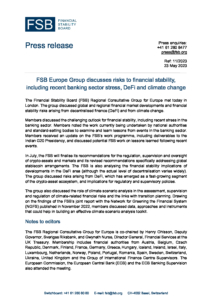Press enquiries:
+41 61 280 8477
[email protected]
Ref: 34/2023
The Financial Stability Board (FSB) Regional Consultative Group for Europe met today in Madrid. The group discussed global and regional financial stability issues and other topics of particular relevance to Europe. This includes the FSB work to address risks arising from leverage in non-bank financial intermediation (NBFI) and from the outsourcing of critical services by financial institutions to third parties. Members also received an update on planned FSB work for 2024.
The banking sector turmoil in March highlighted the importance of effective resolution planning and execution. The FSB’s recently published report on lessons learnt for resolution from the 2023 bank failures identified several areas for further analysis and improvements in the operationalisation and implementation of the international resolution framework. Ahead of the meeting, the group held a roundtable, with invited academics, to discuss the role of deposit insurance and resolution frameworks, as well as how various tools can be brought together to enhance the resilience of the banking sector.
NBFI leverage has increased over the past decade, including through off-balance sheet exposures. Drawing on the recent FSB report that provides an overview of aggregate NBFI leverage trends, members discussed financial stability risks, as well as how vulnerabilities associated with that leverage could be monitored and addressed.
The FSB has developed a toolkit for financial institutions and financial authorities as well as service providers for their third-party risk management and oversight. Members shared their experiences of the oversight and management of financial institutions’ risks from outsourcing of critical services to third parties. The FSB will finalise its recommendations for its toolkit later this year.
Notes to editors
The FSB Regional Consultative Group for Europe is co-chaired by Margarita Delgado, Deputy Governor, Banco de España, and Vasileios Madouros, Deputy Governor, Central Bank of Ireland. Membership includes financial authorities from Austria, Belgium, Czech Republic, Denmark, Finland, France, Germany, Greece, Hungary, Iceland, Ireland, Israel, Italy, Luxembourg, Netherlands, Norway, Poland, Portugal, Romania, Spain, Sweden, Switzerland, Ukraine, United Kingdom and the Group of International Finance Centre Supervisors. The European Commission, the European Central Bank (ECB), the ECB Banking Supervision, the European Securities and Markets Authority, the Single Resolution Board and International Association of Deposit Insurers also attended the meeting.
The FSB has six Regional Consultative Groups, established under the FSB Charter, to bring together financial authorities from FSB member and non-member countries to exchange views on vulnerabilities affecting financial systems and on initiatives to promote financial stability.1 Typically, each Regional Consultative Group meets twice each year.
The FSB coordinates at the international level the work of national financial authorities and international standard-setting bodies and develops and promotes the implementation of effective regulatory, supervisory, and other financial sector policies in the interest of financial stability. It brings together national authorities responsible for financial stability in 24 countries and jurisdictions, international financial institutions, sector-specific international groupings of regulators and supervisors, and committees of central bank experts. The FSB also conducts outreach with approximately 70 other jurisdictions through its six Regional Consultative Groups.
The FSB is chaired by Klaas Knot, President of De Nederlandsche Bank. The FSB Secretariat is located in Basel, Switzerland and hosted by the Bank for International Settlements.
- The FSB Regional Consultative Groups cover the following regions: Americas, Asia, Commonwealth of Independent States, Europe, Middle East and North Africa, and sub-Saharan Africa. [←]
